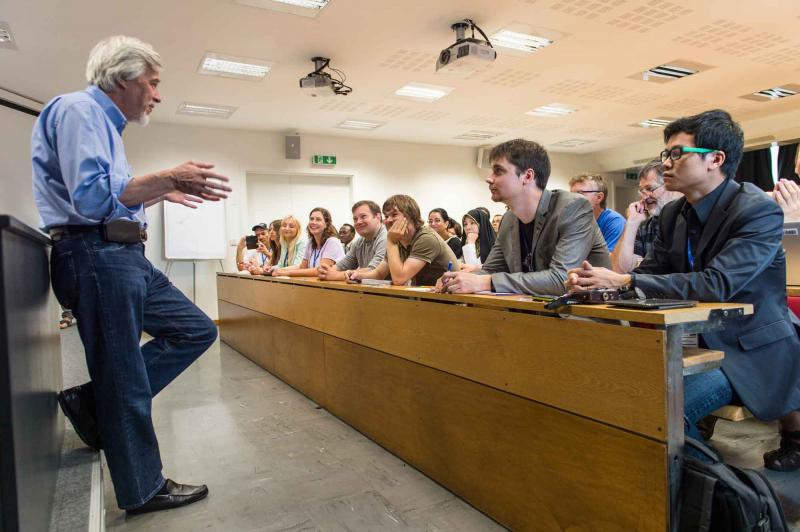CERN welcomed 54 science teachers from 32 countries for the High School Teachers Training Programme 2014. The teachers come from all over the world but the largest constituent this year is the Middle East with eight teachers from Jordan, Palestine, Israel and Iran.
“The programme is very interesting and informative. I am learning a lot about working in teams and it will be very useful for me when I go back to teach,” says Seddigheh Rezapour of Iran.
The programme’s aim is to expose teachers to frontier research and promote teaching of modern physics in high schools, which in turn inspires and motivates their students to continue studying scientific subjects. The three weeks of intensive training include academic lectures on particle physics, hands-on workshops, guided tours to experiments and facilities, and working groups producing lesson plans for schools on CERN-related topics.
The teachers are working in groups on different topics in particle physics. Those from the Middle East are working together to develop lesson plans about SESAME, the synchrotron light facility in Jordan, which will start up next year. The group intends to produce lesson plans suitable for 13 to 15 year olds explaining the functioning of a synchrotron light facility and its many potential applications.

“Most importantly, one of the lessons will also cover the parallels in history of CERN and SESAME,” says Rolf Landua, head of CERN Education and Outreach. “It will carry the message to young students in the Middle East that scientists from all countries of this region are working together peacefully – just as European scientists assembled at CERN 60 years ago, to overcome the past and to work towards a common goal.”
“SESAME is of great interest because it will add to scientific research and bring people of the region together. I hope my students will learn how important it is. Science cultivates respect for each other’s works and encourages working with people from other countries, ” says Mahmoud Aladdasi, who is originally from Jordan but teaches in Qatar.
Besides the Middle East, the other teachers come from countries such as the Dominican Republic, Rwanda, Thailand, Ireland, Nepal, Serbia, Australia, Japan, Canada and the United States and CERN member states.
In their own words
Participants in this year's High School Teachers programme on teaching

The hardest thing to do is to get every student really enthusiastic about particular subjects but that moment when it clicks and their eyes light up, that I love. I’ve taught in England, Mexico, Thailand and every place is different because of the different cultures. In Bahrain, discipline of the students is most challenging in comparison to the other places I’ve taught in. It’s better than the other schools in Bahrain but it is still challenging. Emily Galloway, Bahrain

Everyone should study physics, it is important even if they don’t pursue it academically because it gives them tools on how to think and to think differently. One of my students, a genius in physics and a genius in music, won a national contest and was invited to play a violin solo with a famous philharmonic orchestra. He invited me to his performance. It was wow – I was so proud of him. I still get goosebumps thinking of it. When I go back I want to ask him if physics helped him in his music. Boulous Shehadeh, Israel

Physics is our life, it describes nature, the universe. There are many applications and I always try to show my students how present it is in everything we do. With the internet, access to new knowledge for teachers like me is easier. I teach in an all-girls school and my students are very engaged in the ideas of physics but many won’t pursue higher education because they can’t afford it or can’t leave the country to study more. I was one of them too, I couldn’t afford higher education. We become teachers, wanting to share our love for science. Etaf Aqel Mohamad Baniowda, Palestine
